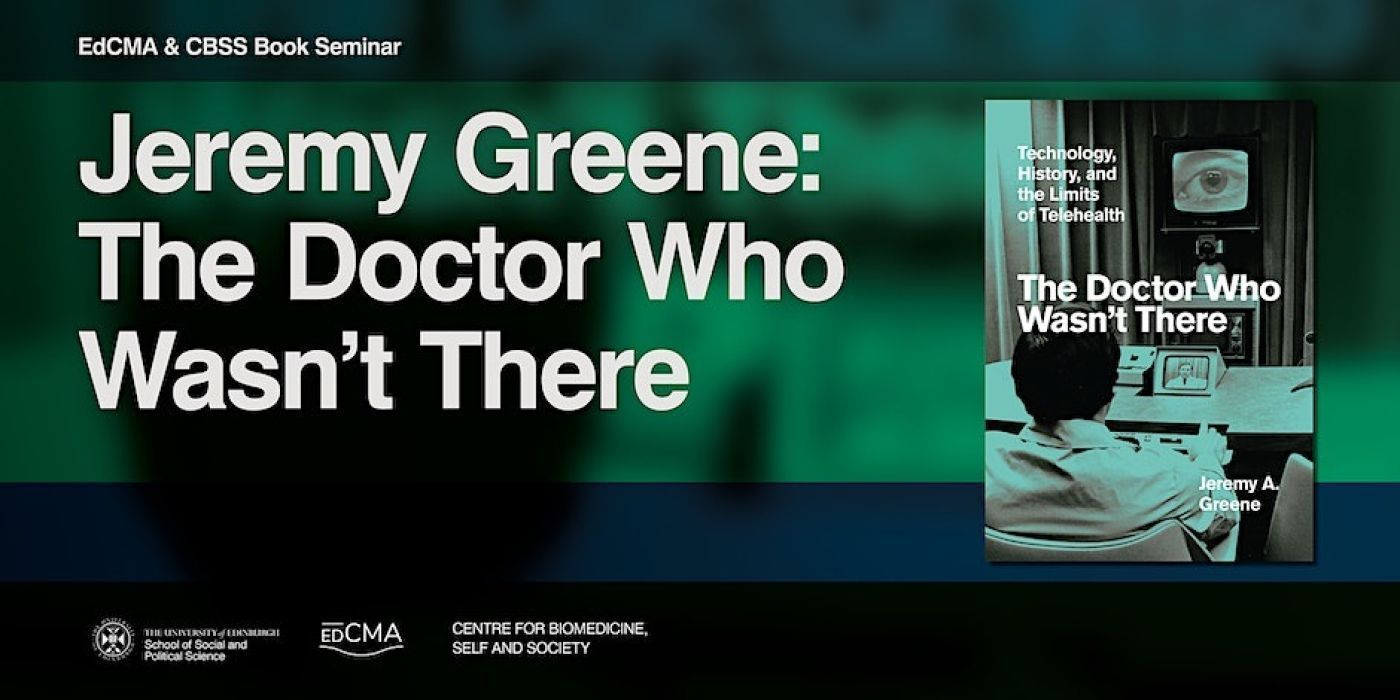Jeremy Greene: The Doctor Who Wasn't There
Venue
Seminar Room 1, Chrystal Macmillan BuildingMedia
Image

Description
A seminar with Jeremy Greene (Johns Hopkins University) to discuss his latest book.
The Doctor Who Wasn’t There traces the long arc of enthusiasm for—and skepticism of—electronic media in health and medicine. Over the past century, a series of new technologies promised to democratize access to healthcare. From the humble telephone to the connected smartphone, from FM radio to wireless wearables, from cable television to the “electronic brains” of networked mainframe computers: each new platform has promised a radical reformation of the healthcare landscape.
With equal attention to the history of technology, the history of medicine, and the politics and economies of American healthcare, physician and historian Jeremy Greene explores the role that electronic media play, for better and for worse, in the past, present, and future of our health. Today’s telehealth devices are far more sophisticated than the hook-and-ringer telephones of the 1920s, the radios that broadcasted health data in the 1940s, the closed-circuit televisions that enabled telemedicine in the 1950s, or the online systems that created electronic medical records in the 1960s. But the ethical, economic, and logistical concerns they raise are prefigured in the past, as are the gaps between what was promised and what was delivered. Each of these platforms also produced subtle transformations in health and healthcare that we have learned to forget, displaced by promises of ever newer forms of communication that took their place. Illuminating the social and technical contexts in which electronic medicine has been conceived and put into practice, Greene’s history shows the urgent stakes, then and now, for those who would seek in new media the means to build a more equitable future for American healthcare.
The Author:
Dr. Jeremy Greene is the William H. Welch Professor of Medicine and the History of Medicine, and Director of the Department of the History of Medicine and the Center for Medical Humanities and Social Medicine. He serves as Core Faculty in the Johns Hopkins Drug Access and Affordability Initiative, Associate Faculty at the Berman Institute of Bioethics, and holds joint appointments in the Department of History of Science and Technology and the Department of Anthropology at the Krieger School of Arts and Sciences.
His first two books, Prescribing by Numbers: Drugs and the Definition of Disease and Generic: The Unbranding of Modern Medicine, (2007 and 2014, Johns Hopkins University Press) describe how the relationship of knowledge and practice, medical science and the pharmaceutical marketplace, and broader understandings of the relationship between medicine and public health can only be understood through understanding the complex histories of medical technologies (like pharmaceuticals) and the series of legislative, regulatory, clinical, and consumer decisions that guide their production, circulation, and consumption. His current book project, tentatively titled The Electronic Patient: Medicine and the Challenge of New Media (forthcoming, University of Chicago Press) examines how changing expectations of instantaneous communications through electric, electronic, and digital media transformed the nature of medical practice and medical knowledge, and is supported by a Faculty Scholars Fellowship from the Greenwall Foundation and a G13 Award from the National Library of Medicine.
Dr. Greene received an MA in medical anthropology from Harvard in 2004, the MD and PhD degrees in the history of science from Harvard in 2005, completed a residency in Internal Medicine at the Brigham & Women’s Hospital in 2008, and is a member of the American College of Physicians. In addition to his appointment at the Institute for the History of Medicine, Greene also practices internal medicine at the East Baltimore Medical Center, a community health center affiliated with Johns Hopkins. His work has been recognized by the Roy Porter Award from the Society for Social History of Medicine, the J. Worth Estes Award and the Richard Shryock Medal from the American Association for the History of Medicine, the Edward Kremers Award from the American Institute for the History of Pharmacy, the Rachel Carson Prize from the Society for the Social Studies of Science, and most recently Dr. Greene was named the 2021 Nicholas Davies Award recipient from the American College of Physicians for “outstanding scholarly activities in history, literature, philosophy, and ethics and contributions to humanism in medicine.”
Partner institutions
- Edinburgh Centre for Medical Anthropology (EdCMA)
- Centre for Biomedicine, Self and Society (CBSS)
